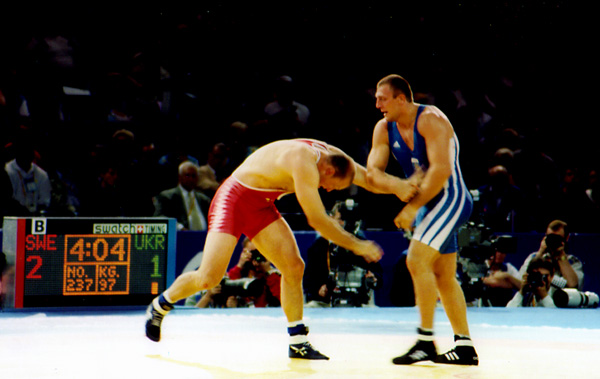1. Overview
Davyd Tengizovich Saldadze (Давид Тенгізович СалдадзеDavyd Tengizovych SaldadzeUkrainian; David Tengizovich SaldadzeDavit Tengizovich SaldadzeUzbek; born February 15, 1978) is a Greco-Roman wrestling athlete of Georgian origin who represented both Ukraine and Uzbekistan in international competitions. He is best known for winning a silver medal in the Men's Greco-Roman wrestling 97 kg category at the 2000 Summer Olympics in Sydney while competing for Ukraine. His career also includes multiple bronze medals at the World, European, and Asian Championships, as well as the Asian Games.
2. Early Life and Background
Davyd Saldadze was born on February 15, 1978, in Kutaisi, then part of the Georgian Soviet Socialist Republic. Hailing from Georgia, he comes from a family with a strong connection to wrestling; his elder brother, Georgiy Saldadze, also achieved success as a Greco-Roman wrestler.
3. Wrestling Career
Davyd Saldadze's wrestling career spanned over a decade, marked by his participation in numerous international competitions and his unique experience of representing two different nations. He competed primarily in Greco-Roman wrestling and adapted to various weight categories throughout his professional journey, achieving significant milestones at various levels of competition.
3.1. National Representation
Saldadze began his international career representing Ukraine. It was under the Ukrainian flag that he achieved his most significant success, including his Olympic silver medal in 2000. Following his participation in the 2004 Summer Olympics for Ukraine, Saldadze transitioned to representing Uzbekistan starting in 2006. This change in national allegiance allowed him to continue competing at the highest level, including appearances at the 2008 Summer Olympics and the 2010 Asian Games for Uzbekistan.
3.2. Major International Achievements
Saldadze secured multiple medals across various prestigious international wrestling competitions throughout his career, showcasing his consistent performance in the Greco-Roman discipline.
3.2.1. Olympic Games
Saldadze participated in three Olympic Games, representing Ukraine in 2000 and 2004, and Uzbekistan in 2008.
- At the 2000 Summer Olympics in Sydney, competing for Ukraine in the 97 kg Greco-Roman category, he earned a silver medal, marking the pinnacle of his Olympic career.
- He subsequently competed in the 2004 Summer Olympics in Athens, participating in the 96 kg Greco-Roman event. However, he was eliminated in the preliminary rounds without securing a victory.
- His final Olympic appearance was at the 2008 Summer Olympics in Beijing, where he represented Uzbekistan in the 120 kg Greco-Roman category. He was defeated in his opening match.

3.2.2. World Championships
Saldadze achieved a podium finish at the World Wrestling Championships. He won a bronze medal at the 1998 World Wrestling Championships held in Gävle, competing in the 97 kg weight class.

3.2.3. Continental Championships and Games
Davyd Saldadze also garnered several medals at continental events across both Europe and Asia, reflecting his successful transitions between different national representations.
- European Wrestling Championships:**
- He secured a bronze medal at the 2002 European Wrestling Championships in Seinäjoki, competing in the 96 kg category.
- The following year, he won another bronze medal at the 2003 European Wrestling Championships in Belgrade, also in the 96 kg weight class.
- Asian Games:**
- Representing Uzbekistan, Saldadze earned a bronze medal at the 2010 Asian Games held in Guangzhou, where he competed in the 96 kg division.
- Asian Wrestling Championships:**
- He clinched a bronze medal at the 2008 Asian Wrestling Championships in Jeju, competing in the 120 kg category.
4. Personal Life
Davyd Saldadze's personal life is notably connected to the sport of wrestling through his family. His elder brother, Georgiy Saldadze, is also a distinguished Greco-Roman wrestler, indicating a strong familial legacy in the sport.
5. Legacy and Assessment
Davyd Saldadze's career is notable for his achievements across multiple international platforms and his representation of two different nations, Ukraine and Uzbekistan, which is relatively uncommon in individual sports. His silver medal at the 2000 Sydney Olympics stands as his most significant accomplishment, cementing his place among the top Greco-Roman wrestlers of his era. His consistent medal wins at continental and world championships further underscore his skill and dedication to the sport, making him a respected figure in the history of Greco-Roman wrestling.